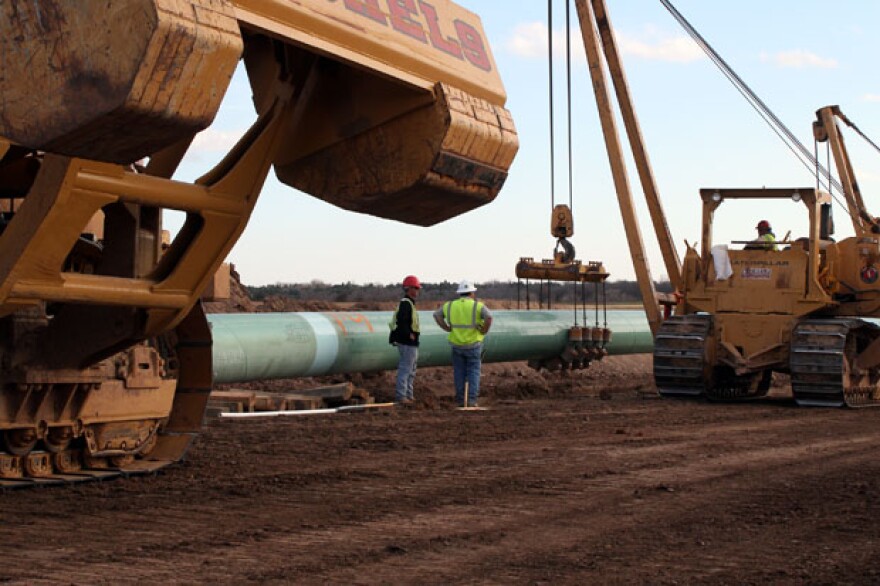A booming U.S. oil industry has led to near-record amounts of oil production, which has helped drive down oil prices. The energy industry has responded by storing crude instead of selling it at discount rates. That has created a unique situation in Oklahoma, where a major oil storage hub is on track to fill up — completely.
One-fifth of the country’s commercial crude oil storage capacity is located Cushing, Okla., a small city of about 7,900 in northeastern Oklahoma. On the city’s outskirts, field after field are filled with hulking steel storage tanks.
Pumps, compressors and valves hum and shudder. Tanker trucks pull off the busy road and line up at terminals. Sci-fi chirps echo as welders and workers drag cables inside tanks they’re rushing to build. Cushing has room for 71 million barrels of oil, but it’s not enough.
“There’s actually some thought by Memorial Day, if this doesn’t somehow correct itself, we could be, essentially, at a limit of having full storage,” says Steve Agee, an economist and Dean of the Meinders School of Business at Oklahoma City University.
Right now, there are about 54 million barrels of crude just sitting in the Cushing oil hub — a record, data from the U.S. Energy Information Administration show.
“Kudos to the oil and gas industry, but they’re kind of their own worst enemy by doing this,” Agee says.

The U.S. oil industry has been so effective at using horizontal drilling and well completion techniques like hydraulic fracturing, known as “fracking,” to unlock oil from shale rock, the supply of crude has outpaced worldwide demand, Agee says. That’s one reason why oil prices have plummeted in recent months.
Andrew Lipow, president of Lipow Oil Associates, a Houston-based consulting firm, says the U.S. is at the highest national crude inventory level in nearly 80 years. Low oil prices and prolific supply means North American crude is “looking for a place to go,” he says.
Low oil prices can be an opportunity for energy companies and traders. Some are stashing oil in tank farms like Cushing, or in rail cars — and even tanker ships. They’re betting on buying cheap oil, storing it, and selling it later when prices increase, Lipow says.
“Which means anyone who has tanks is going to fill them up,” he says.
Lipow says the U.S. energy industry has both created and dealt with oil stockpiles in recent years. But not all stockpiles are intentional. In March 2011, the Cushing oil hub had fewer tanks and reached 90 percent capacity. That build-up was more physical than financial, Lipow says.
“One of the differences this year compared to years ago is we’ve got several major pipelines that now connect Cushing to the Texas Gulf Coast,” he says.
In 2011, Cushing’s “glut” grew as crude flowed into the oil hub faster than it could leave — a bottleneck fueled by a shortage of pipeline capacity to carry oil to refineries along Texas’ Gulf Coast.

Pipelines like Seaway and Keystone Gulf helped relieve the glut, but now crude is stockpiling in Cushing because the energy industry doesn’t want to sell its product at low prices — currently $50.45 per barrel.
For the energy industry, Cushing is strategic and symbolic. It’s the location where the primary U.S. oil price, known as West Texas Intermediate, is set. If the Oklahoma oil hub reaches operational capacity, Agee says the effect on the oil market could be practical and psychological.
“Prices would most definitely fall. To what level, we don’t know,” he says, adding that the impact of continued low oil prices could be profound, especially in big energy states.
“Oklahoma is a net exporter, we produce more oil than we consume, so it will hurt Oklahoma more than it will a state that’s not an oil-producing state,” he says.
Oklahoma’s oil hub may not fill. Agee and Lipow, the consultant, say storage in tanks might drop later this spring when refineries demand more oil to make summer blends of gasoline. Or, the flow could stall as low oil prices force energy companies to continue idling rigs and laying off workers.
-------------------------------------------------
StateImpact Oklahoma is a partnership among Oklahoma’s public radio stations and relies on contributions from readers and listeners to fulfill its mission of public service to Oklahoma and beyond. Donate online.








